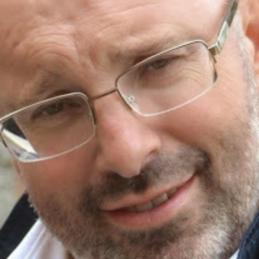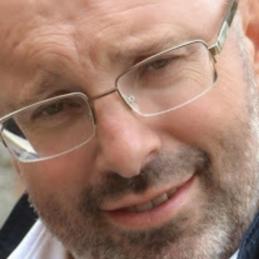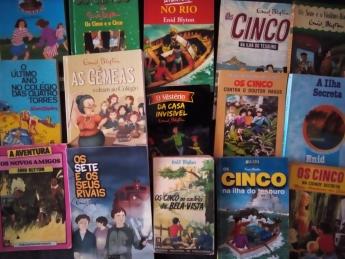África…Terra Nova - XVIII

Mais uma edição com o Professor António Batel Anjo de "África…Terra Nova", que hoje nos fala do relatório “"A future for the world's children?”
O mundo está a falhar na garantia de que as crianças tenham um 'planeta habitável', está escrito no relatório “Que futuro para as crianças em todo o mundo?” ("A future for the world's children?") elaborado para a "WHO–UNICEF–Lancet Commission" por um vasto conjunto de cientistas.
O Mundo não consegue proteger a saúde das crianças e o seu futuro face à intensificação da degradação ecológica, das mudanças climáticas e de práticas de marketing abusivas, afirma este relatório.
O relatório diz que, apesar das melhorias drásticas na sobrevivência, nutrição e educação nos últimos 20 anos, "as crianças de hoje enfrentam um futuro incerto", com todas as crianças (dos países pobres e ricos) a enfrentar "ameaças existenciais".
“Em 2015, o mundo concordou com as metas estabelecidas nos Objectivos de Desenvolvimento Sustentável (ODS), no entanto, quase cinco anos depois, são poucos os países registaram algum progresso”, diz o relatório.
“Mudanças climáticas, degradação ecológica, refugiados, conflitos, desigualdades generalizadas e práticas comerciais abusivas ameaçam a saúde e o futuro das crianças em todos os países”, é também afirmado no relatório.
A Organização Mundial da Saúde (OMS), a Unicef e a revista médica Lancet, pede mudanças radicais para proteger a saúde e o futuro das crianças da intensificação da emergência climática.
O relatório destaca igualmente a ameaça de práticas comerciais abusivas que expõe as crianças à comercialização de “fast food” e de bebidas açucaradas, sendo que a obesidade infantil aumentou 11 vezes. (de 11 milhões em 1975 para 124 milhões em 2016).
No índice de 180 países que compara dados sobre sobrevivência, bem-estar, saúde, educação e nutrição; bem como a sustentabilidade, o efeito das emissões de gases com efeito estufa, a equidade ou diferenças de financeiras (de renda), Noruega, Coreia do Sul, Holanda, França e Irlanda são os melhores países para uma criança viver. A República Centro-Africana, Chade, Somália, Níger e Mali são os cinco últimos da lista. Moçambique ocupa o lugar 170.
Porém, quando o desempenho é comparado em termos das emissões de carbono "per capita", Burundi, Chade e Somália são os que têm melhor desempenho, com Moçambique no 29 lugar, enquanto os EUA, a Austrália e a Arábia Saudita estão entre os dez países mais poluentes. Tendo em consideração as emissões de CO2 "per capita", os principais países, a Noruega ocupa o lugar 156, a República da Coreia 166 e a Holanda 160. Segundo o relatório cada um dos três emite 210% mais CO2 per capita do que a meta estabelecida para 2030.
O países com capacidade de atingir as metas de emissão de CO2 per capita até 2030, além de apresentar um desempenho razoável (entre os 70 principais) em medidas que protegem o crescimento infantil, são: a Albânia, a Armênia, a Grenada, Jordânia, Moldávia, Sri Lanka, Tunísia, Uruguai e Vietname.", conclui-se da leitura do relatório.
Os especialistas afirmam que "enquanto os países mais pobres precisam fazer muito mais para apoiar as suas crianças a viverem vidas mais saudáveis, as emissões excessivas de carbono - dos países mais ricos - ameaçam o futuro de todas as crianças".
As crianças que vivem nos países mais pobres estão a enfrentar o impacto das mudanças climáticas severas, apesar de terem uma pequena pegada de carbono. As crianças que já enfrentavam enormes desafios no seu bem-estar e saúde, estão agora também em maior risco devido à crise climática.
De facto, precisamos de trabalhar muito mais e investir de forma sustentável na saúde e no desenvolvimento infantil para que as nossas crianças tenham um futuro melhor. No entanto, os países (ricos) emissores de carbono precisam de as reduzir estas emissões para que todas as crianças prosperem – sejam pobres ou ricas.
---
"A future for the world's children? A WHO–UNICEF–Lancet Commission" Helen Clark, MA *, Awa Marie Coll-Seck, MD *, Anshu Banerjee, MD, Stefan Peterson, MD, Sarah L Dalglish, PhD, Prof Shanthi Ameratunga, MBChB, et al., February 18, 2020.
DOI: https://doi.org/10.1016/S0140-6736(19)32540-1
Sumário Executivo
Despite dramatic improvements in survival, nutrition, and education over recent decades, today's children face an uncertain future. Climate change, ecological degradation, migrating populations, conflict, pervasive inequalities, and predatory commercial practices threaten the health and future of children in every country. In 2015, the world's countries agreed on the Sustainable Development Goals (SDGs), yet nearly 5 years later, few countries have recorded much progress towards achieving them. This Commission presents the case for placing children, aged 0–18 years, at the centre of the SDGs: at the heart of the concept of sustainability and our shared human endeavour. Governments must harness coalitions across sectors to overcome ecological and commercial pressures to ensure children receive their rights and entitlements now and a liveable planet in the years to come.
Invest in children's health for lifelong, intergenerational, and economic benefits
The evidence is clear: early investments in children's health, education, and development have benefits that compound throughout the child's lifetime, for their future children, and society as a whole. Successful societies invest in their children and protect their rights, as is evident from countries that have done well on health and economic measures over the past few decades. Yet many politicians still do not prioritise investing in children, nor see it as the foundation for broader societal improvements. Even in rich countries, many children go hungry or live in conditions of absolute poverty, especially those belonging to marginalised social groups—including indigenous populations and ethnic minorities. Too often, the potential of children with developmental disabilities is neglected, restricting their contributions to society. Additionally, many millions of children grow up scarred by war or insecurity, excluded from receiving the most basic health, educational, and developmental services.
Decision makers need a long-term vision. Just as good health and nutrition in the prenatal period and early years lay the foundation for a healthy life course, the learning and social skills we acquire at a young age provide the basis for later development and support a strong national polity and economy. High-quality services with universal health-care coverage must be a top priority. The benefits of investing in children would be enormous, and the costs are not prohibitive: an analysis of the SDGs suggests a financing gap of US$195 per person. To ensure stronger economic and human development, each government must assess how to mobilise funding using instruments that help the poorest proportion of the population to meet this gap for children, and frame these as the most powerful investments a society can make. But investments are not just monetary: citizen participation and community action, including the voices of children themselves, are powerful forces for change that must be mobilised to reach the SDGs. Social movements must play a transformational role in demanding the rights that communities need to care for children and provide for families.
Government has a duty of care and protection across all sectors
Countries that support future generations put a high priority on ensuring all children's needs are met, by delivering entitlements, such as paid parental leave, free primary health care at the point of delivery, access to healthy—and sufficient amounts of—food, state-funded or subsidised education, and other social protection measures. These countries make sure children grow up in safe and healthy environments, with clean water and air and safe spaces to play. They respect the equal rights of girls, boys, and those with non-conforming gender identities. Policy makers in these countries are concerned with the effect of all policies on all children, but especially those in poorer families and marginalised populations, starting by ensuring birth registration so that the government can provide for children across the life course, and help them to become engaged and productive adult citizens. The rights and entitlements of children are enshrined within the UN Convention on the Rights of the Child (CRC) ratified by all countries, except the USA. Countries might provide these entitlements in different ways, but their realisation is the only pathway for countries to achieve the SDGs for children's health and wellbeing, and requires decisive and strong public action.
Since threats to child health and wellbeing originate in all sectors, a deliberately multisectoral approach is needed to ensure children and adolescents survive and thrive from the ages of 0–18 years, today and in the future. Investment in sectors beyond health and education—such as housing, agriculture, energy, and transport—are needed to address the greatest threats to child health and wellbeing. Political commitment at executive level is needed to coordinate across sectors and leverage synergies across the life course, ensuring universal health coverage; good nutrition and food security for all; thoughtful urban planning; safe and affordable housing and transport; clean energy for all; and equitable social welfare policies. Multisectoral governance might take different forms in each country, but it will require strategic partnerships, cabinet-level coordination across ministries, and management of diverse partners, with clear roles for each, including for non-state actors and the private sector. Heads of state or prime ministers must designate a cross-cutting government ministry or equivalent to ensure joined-up action and budgeting for pro-child policies and to demand harmonised assistance from global stakeholders, whose support is currently fragmented and inefficient.
Measure how children flourish today, but also how countries' greenhouse gas emissions are destroying their future
Wealthy countries generally have better child health and development outcomes, but their historic and current greenhouse gas emissions threaten the lives of all children. The ecological damage unleashed today endangers the future of children's lives on our planet, their only home. As a result, our understanding of progress on child health and wellbeing must give priority to measures of ecological sustainability and equity to ensure we protect all children, including the most vulnerable. We assessed the feasibility of monitoring countries' progress through a new child flourishing and futures profile, developed on the basis of survive and thrive SDG indicators reported by 180 countries, territories, and areas (hereafter referred to as countries), and future threats to children's wellbeing using the proxy of greenhouse gas emissions by country. We also complemented the profile with existing measures of economic equity. The poorest countries have a long way to go towards supporting their children's ability to live healthy lives, but wealthier countries threaten the future of all children through carbon pollution, on course to cause runaway climate change and environmental disaster. Not a single country performed well on all three measures of child flourishing, sustainability, and equity.
The SDG indicators already provide a strong foundation for monitoring progress. However, we only found a very small amount of country data for the indicators used to track child health and wellbeing, which all countries agreed to collect. SDG monitoring needs a strong boost in investment to bridge the large data gaps in key indicators (with <50% of countries reporting data for many indicators), to allow for subnational disaggregation if governments are to monitor, review, and act. To ensure our children grow and flourish, we require timely and accurate population data on health, nutrition, educational access and performance, housing, and environmental security, among other entitlements. Harnessing the power of citizen accountability mechanisms will be essential to fill the data gaps. We also propose the development of user-friendly country dashboards to assess the effects on children's wellbeing and sustainable development. Given the urgency for action, regular reports on the SDGs to the UN General Assembly must be the anchor of strong advocacy on action for children everywhere.
Adopt a new protocol to the UN CRC to regulate against commercial harm to children
Although we recognise the role business plays in wealth and job creation, the commercial sector's profit motive poses many threats to child health and wellbeing, not least the environmental damage unleashed by unregulated industry. More immediately, children around the world are enormously exposed to advertising from business, whose marketing techniques exploit their developmental vulnerability and whose products can harm their health and wellbeing. Companies make huge profits from marketing products directly to children and promoting addictive or unhealthy commodities, including fast foods, sugar-sweetened beverages, alcohol, and tobacco, all of which are major causes of non-communicable diseases. Children's large and growing online exposure, while bringing benefits in terms of information access and social support, also exposes them to exploitation, as well as to bullying, gambling, and grooming by criminals and sexual abusers.
Industry self-regulation does not work, and the existing global frameworks are not sufficient. A far stronger and more comprehensive approach to regulation is required. We call for the development of an Optional Protocol to the CRC (ie, an additional component to the treaty that must be independently ratified), to protect children from the marketing of tobacco, alcohol, formula milk, sugar-sweetened beverages, gambling, and potentially damaging social media, and the inappropriate use of their personal data. Countries who have led the way in protecting children from the harms of commercial marketing, supported by civil society, can support a protocol for adoption by the UN General Assembly, providing impetus for further legal and constitutional protections for children at national level.
Children and young people are full of energy, ideas, and hope for the future. They are also angry at the state of the world. Worldwide, school-children and young people are protesting about environmental threats from fossil fuel economies. We must find better ways to amplify their voices and skills for the planet's sustainable and healthy future. The SDGs require governments to place children at the very centre of their plans to address this crisis. This Commission makes positive and optimistic recommendations–but we have no time to lose, and no excuses if we fail. A new global movement for child and adolescent health is today an urgent necessity.
**********************************************
Proposta Musical:
E depois deste relatório tão rel e perturbador, tomamos um "Café" motivador com Stewart Sukuma, um dos cantores mais conhecidos de Moçambique com uma longa carreira coroado de êxitos!
https://www.youtube.com/watch?v=BJWSDD5Cftg
Este podcast tem áudios Registe-se para ouvir.

Episódios
-
Imagem
 África…Terra Nova - XXIV02.04.2020Ouvir
África…Terra Nova - XXIV02.04.2020OuvirHoje em mais uma edição do "África…Terra Nova", o professor António Batel Anjo fala do Ensino à Distância - Longe da vista, perto de um ecrã!
Ensinar longe da vista, mas perto de um ecrã!
O encerramento forçado de Escolas e Universidades um pouco por todo o mundo, ao qual Portugal e Moçambique não foram excepção, criou a necessidade de encontrar outros meios de ensino e aprender.
-
Imagem
 Ror de Livros: livros imperdíveis - XVI01.04.2020Ouvir
Ror de Livros: livros imperdíveis - XVI01.04.2020OuvirJorge Pires hoje fala dos livros de Enid Blyton, dos cinco e outros que tais para ocupar o tempo dos mais novos!
-
Imagem
 Maria José Santana - Ílhavense e AveiroMag01.04.2020Ouvir
Maria José Santana - Ílhavense e AveiroMag01.04.2020OuvirMaria José Santana, diretora do jornal O Ílhavense e da Magazine online AveiroMag, fala sem medo e com sinceridade sobre os desafios que enfrentam os profissionais e os orgãos de comunicação social locais, nesta época tão adversa.
-
Imagem
 Pela Nossa Saúde - Ep 0701.04.2020Ouvir
Pela Nossa Saúde - Ep 0701.04.2020OuvirDe segunda a sexta-feira, Luís Sancho, Professor na Escola Superior de Saúde da Universidade de Aveiro, junta-se às nossas manhãs para falar sobre um tema que a todos diz respeito - a nossa saúde!
Sistema Respiratório - Laringe (continuação)
-
Imagem
 Educação à Escuta - Ep. 08 Rosa Madeira01.04.2020Ouvir
Educação à Escuta - Ep. 08 Rosa Madeira01.04.2020OuvirUm programa da responsabilidade do CIDT FF da Universidade de Aveiro. Porque a diferença está na Educação e a Educação faz toda a diferença!
Rosa Madeira, Professora e Investigadora na Universidade de Aveiro fala de questões relacionadas com a Infância, a Diversidade Cultural e a Participação Comunitária.